Some of the most beautiful and profound prophecies of the coming Messiah are found in the Book of Isaiah. It began to be written at a time when the very existence of the Israelites was in danger, threatened by the king of Assyria. The prophecies speak of the coming of “Immanuel,” His sufferings, the establishment of justice and peace and a new heavens and a new earth, both temporal and eternal. While many modern biblical scholars reduce Isaiah to a mere historical text with perhaps a preview of Heaven at its end, the Early Church Fathers did not. They saw its fulfillment as multi-layered in that, what Jesus accomplished in Himself, would then find its eventual fulfillment also through His mystical Body. In other words, the prophecies of Isaiah were fulfilled, are being fulfilled, and will be fulfilled.
For the mysteries of Jesus are not yet completely perfected and fulfilled. They are complete, indeed, in the person of Jesus, but not in us, who are his members, nor in the Church, which is his mystical body. —St. John Eudes, treatise “On the Kingdom of Jesus”, Liturgy of the Hours, Vol IV, p 559
Isaiah’s prophecies are therefore a compressed vision of events that would unfold over millennia and not just within his own historical context or even the thirty-three years that Jesus walked the earth. Rather, he foresaw the restoration of all creation through the Fiats of Redemption and Sanctification that would culminate in an “Era of Peace” on earth before the end of the world. St. Justin Martyr, writing on the basis of Sacred Tradition as was handed on to him, said:
I and every other orthodox Christian feel certain that there will be a resurrection of the flesh followed by a thousand years in a rebuilt, embellished, and enlarged city of Jerusalem, as was announced by the Prophets Ezekiel, Isaias and others… A man among us named John, one of Christ’s Apostles, received and foretold that the followers of Christ would dwell in Jerusalem for a thousand years, and that afterwards the universal and, in short, everlasting resurrection and judgment would take place. —St. Justin Martyr, Dialogue with Trypho, Ch. 81, The Fathers of the Church, Christian Heritage
He is referring to the period in Rev 20:1-4 when, after the chaining of Satan, the Kingdom of God would reign in Christ’s saints as the “perfection and fulfillment” of the mysteries of Christ in order to “resurrect” or restore, not only all men, but all creation to Himself (cf. Eph 1:10). The Fathers understood this fruition and fulfillment of Scripture to take place on the “Day of the Lord.” [1]The term “all men” can only be understood as Christ’s redemptive act making salvation possible for all men. The actuation of the merits of the Cross still depend upon the free will of each individual, and thus, even though Christ willed that “all men be saved” (1 Tim 2:4), tragically, not all accept this free gift. It must be remembered that the Church Fathers also employed the highly symbolic language of the prophets, especially Isaiah. For example, the “thousand years” was not to be understood as literal:
Now… we understand that a period of one thousand years is indicated in symbolic language. —St. Justin Martyr, Dialogue with Trypho, Ch. 81, The Fathers of the Church, Christian Heritage
Nor did the Church Fathers teach that Jesus would return to reign on earth in the flesh, which was quickly condemned as the heresy of millennarianism. Rather, on the basis of what the Apostle St. John “received and foretold,” the Church Fathers explained the “millennium,” drawing upon the Old Testament prophets, as a period of peace when the fruits of the Cross would vindicate the Word of God and liberate creation to a certain degree through “spiritual blessings” (the complete perfection of creation is reserved for Heaven and will only come universally after the Final Judgment in a definitive “new heavens and new earth”):
We do confess that a kingdom is promised to us upon the earth, although before heaven, only in another state of existence; inasmuch as it will be after the resurrection for a thousand years in the divinely-built city of Jerusalem… We say that this city has been provided by God for receiving the saints on their resurrection, and refreshing them with the abundance of all really spiritual blessings, as a recompense for those which we have either despised or lost… —Tertullian (155–240 A.D.), Nicene Church Father; Adversus Marcion, Ante-Nicene Fathers, Henrickson Publishers, 1995, Vol. 3, pp. 342-343)
Employing Isaiah’s language to indicate the effects of grace upon creation, including even man’s health, St. Justin writes:
These are the words of Isaiah concerning the millennium: ‘For there will be a new heaven and a new earth, and the former will not be remembered nor come into their heart, but they will be glad and rejoice in these things, which I create… There shall no more be an infant of days there, nor an old man that shall not fill up his days; for the child shall die a hundred years old… For as the days of the tree of life, so shall be the days of My people, and the works of their hands shall be multiplied. My elect shall not labor in vain, nor bring forth children for a curse; for they shall be a righteous seed blessed by the Lord, and their posterity with them.’ —Dialogue with Trypho, Ch. 81, The Fathers of the Church, Christian Heritage; cf. Is 54:1
To explore the Church Father’s teachings on the imminent Era of Peace, see:
The Resurrection of the Church
Millenarianism… What it is, and isn’t
Also see Daniel O’Connor’s exhaustive and highly readable book on the subject, available for free on Kindle: The Crown of Sanctity: On the Revelations of Jesus to Luisa Piccarreta.
In that light, we visit today’s first Mass reading where we hear Isaiah anticipate the “worldwide” fruits of the Passion and resurrection of the “Suffering Servant” in an Era of Peace and justice:
…he shall bring forth justice to the nations, not crying out, not shouting, not making his voice heard in the street. A bruised reed he shall not break, and a smoldering wick he shall not quench, until he establishes justice on the earth; the coastlands will wait for his teaching. (Today’s First Reading)
Footnotes
| ↑1 | The term “all men” can only be understood as Christ’s redemptive act making salvation possible for all men. The actuation of the merits of the Cross still depend upon the free will of each individual, and thus, even though Christ willed that “all men be saved” (1 Tim 2:4), tragically, not all accept this free gift. |
|---|

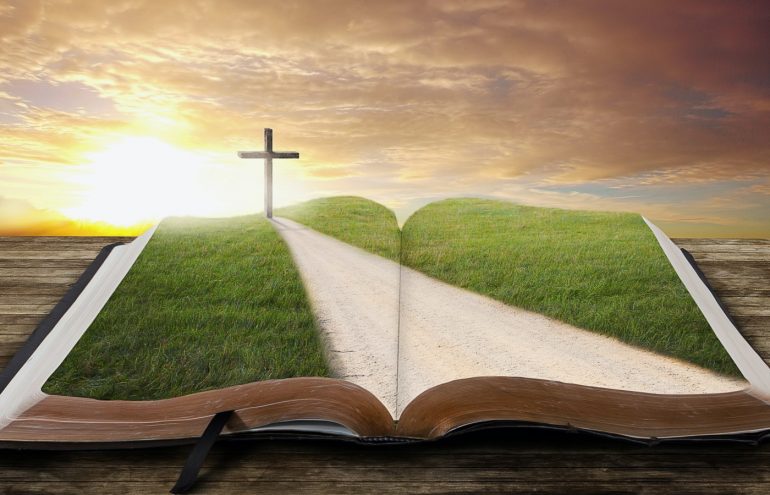

 Alicja Lenczewska
Alicja Lenczewska

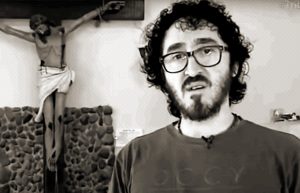

 Elizabeth Kindelmann
Elizabeth Kindelmann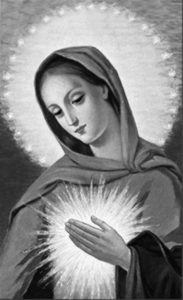 Through what became The Spiritual Diary, Jesus and Mary taught Elizabeth, and they continue to instruct the faithful in the divine art of suffering for the salvation of souls. Tasks are assigned for each day of the week, which involve prayer, fasting, and night vigils, with beautiful promises attached to them, laced with special graces for priests and the souls in purgatory. In their messages, Jesus and Mary say that The Flame of Love of the Immaculate Heart of Mary is the greatest grace given to mankind since the Incarnation. And in the not-so-distant future, her flame will engulf the entire world.
Through what became The Spiritual Diary, Jesus and Mary taught Elizabeth, and they continue to instruct the faithful in the divine art of suffering for the salvation of souls. Tasks are assigned for each day of the week, which involve prayer, fasting, and night vigils, with beautiful promises attached to them, laced with special graces for priests and the souls in purgatory. In their messages, Jesus and Mary say that The Flame of Love of the Immaculate Heart of Mary is the greatest grace given to mankind since the Incarnation. And in the not-so-distant future, her flame will engulf the entire world.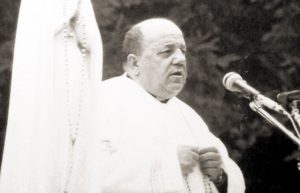 Father Stefano Gobbi
Father Stefano Gobbi Why Gisella Cardia?
Why Gisella Cardia? Thirdly, the messages have frequently been accompanied by visible phenomena, photographic evidence found in In Cammino con Maria, which cannot be the fruit of subjective imagination, notably the presence of the stigmata on Giselle’s body and and the appearance of crosses or religious texts in blood on Gisella’s arms. See the pictures taken from her apparition website
Thirdly, the messages have frequently been accompanied by visible phenomena, photographic evidence found in In Cammino con Maria, which cannot be the fruit of subjective imagination, notably the presence of the stigmata on Giselle’s body and and the appearance of crosses or religious texts in blood on Gisella’s arms. See the pictures taken from her apparition website 
 Jennifer
Jennifer
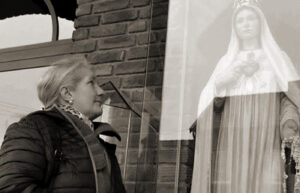 Why Manuela Strack?
Why Manuela Strack?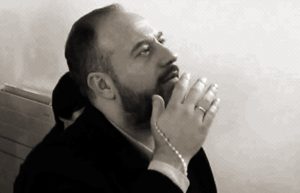

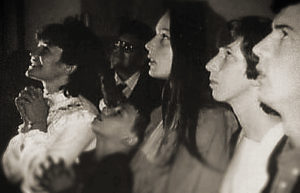 Why the Visionaries of Our Lady of Medjugorje?
Why the Visionaries of Our Lady of Medjugorje?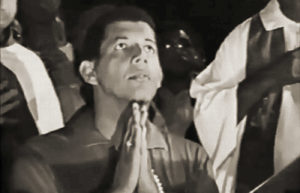 Why Pedro Regis?
Why Pedro Regis? Why the Servant of God Luisa Piccarreta?
Why the Servant of God Luisa Piccarreta? of the saints. It wasn’t until she became a “Daughter of Mary” that the nightmares finally ceased at the age of eleven. In the following year, Jesus began to speak interiorly to her especially after receiving Holy Communion. When she was thirteen, He appeared to her in a vision that she witnessed from the balcony of her home. There, in the street below, she saw a crowd and armed soldiers leading three prisoners; she recognized Jesus as one of them. When He arrived beneath her balcony, He raised his head and cried out: “Soul, help Me!” Deeply moved, Luisa offered herself from that day on as a victim soul in expiation for the sins of mankind.
of the saints. It wasn’t until she became a “Daughter of Mary” that the nightmares finally ceased at the age of eleven. In the following year, Jesus began to speak interiorly to her especially after receiving Holy Communion. When she was thirteen, He appeared to her in a vision that she witnessed from the balcony of her home. There, in the street below, she saw a crowd and armed soldiers leading three prisoners; she recognized Jesus as one of them. When He arrived beneath her balcony, He raised his head and cried out: “Soul, help Me!” Deeply moved, Luisa offered herself from that day on as a victim soul in expiation for the sins of mankind. immobile, rigid-like state that appeared almost as if she were dead. It was only when a priest made the sign of the Cross over her body that Luisa regained her faculties. This remarkable mystical state persisted until her death in 1947—followed by a funeral that was no little affair. During that period in her life, she suffered no physical illness (until she succumbed to pneumonia at the end) and she never experienced bedsores, despite being confined to her little bed for sixty-four years.
immobile, rigid-like state that appeared almost as if she were dead. It was only when a priest made the sign of the Cross over her body that Luisa regained her faculties. This remarkable mystical state persisted until her death in 1947—followed by a funeral that was no little affair. During that period in her life, she suffered no physical illness (until she succumbed to pneumonia at the end) and she never experienced bedsores, despite being confined to her little bed for sixty-four years. Why Simona and Angela?
Why Simona and Angela?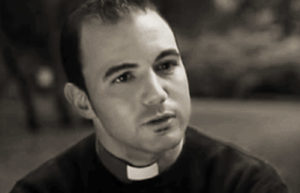
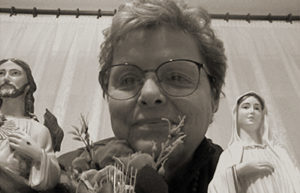 Valeria Copponi
Valeria Copponi